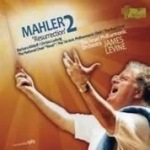The Second and the Eighth are the two symphonies missing from James Levine’s Mahler cycle for RCA, recorded during the late 1970s through the mid-’80s. This live recording from 1989 partially fills that gap. The excellence of Levine’s RCA recordings created high expectations for this release, expectations that are not fully met. Levine appears strangely unfocused in the first movement, seeming unable to make up his mind about tempo–one moment Bernstein’s deliberateness, the next Klemperer’s briskness. The orchestral timbre constantly shifts as well–instrumental balances (woodwinds with strings) don’t always make the type of sound we associate with Mahler, while the brass are at times barely audible, at others unduly prominent, no matter Mahler’s directions.
A major factor in this impression is the sound produced by the acoustically distressed Mann Auditorium which, with its paradoxical combination of hard reflections and sonic dampening, makes you wonder how the musicians can hear each other at all. (There’s no problem hearing the percussion section–it dominates every passage it plays.)
Following Levine’s somewhat non-committal direction, the Israel Philharmonic musicians play as if they missed their morning coffee. A certain drowsiness hovers over the music-making, which lacks the tension and bite you’d expect (especially after performances like Klemperer’s, or even Solti’s). However, the performance does begin to gather steam with the second and third movements (the scherzo features plenty of both lightness and punch).
Christa Ludwig delivers a rather matronly yet quite moving Urlicht, after which things really get going with the big explosion that launches the Finale. Here at last is Levine the great Mahler conductor we expect–focused, musically impeccable, and exciting. The climaxes are powerful, while the gentle, serene passages are beautifully done. The Israel Philharmonic fires on all cylinders, even if the occasional intonational lapse and odd ensemble balance indicates continuing “Mann troubles”.
The combined choruses offer rapt singing in the quiet passages, while the men seize the attention with their forceful “Was vergangen, auferstehen!”. Soprano Barbara Kilduff intertwines sweetly with Ludwig in the “O schmerz” buildup to the great coda, where Levine goes all out, making it quite moving (even if it doesn’t reach the transcendent heights of Bernstein and Tennstedt). The recording faithfully reproduces the acoustic setting, albeit through a patina of tape hiss.
So, while this won’t do as a primary Mahler Second recording (for that you should pick from any of the reference recordings above), it’s fine enough for Levine fans to purchase and enjoy as they wait for some label to release his Mahler Eighth (the fabulous live performance with the Chicago Symphony would be ideal) to complete their collections.
































